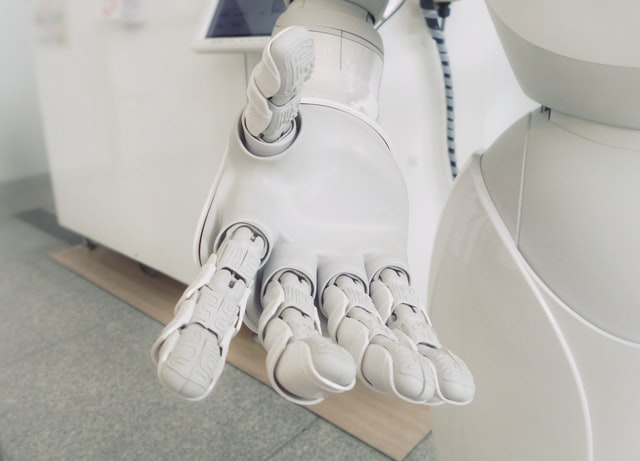
In the world fueled by innovation, technology is the new emperor and Artificial Intelligence, in particular, has been making a name for itself, rising to prominence in almost every industry, from finances and supply chain to healthcare and education. Designed to improve efficiency and reduce error rate, it may revolutionize everything we know about education and create a world of equal opportunity and outstanding productivity. With a 54% year-on-year in 2020, the market for Artificial Intelligence (AI) is booming, as new industries begin to introduce new technologies into their structures. According to Appen’s whitepaper on The State of AI and Machine Learning, nearly 3 out of 4 organizations said AI was critical to their business, and the technology is still in its infancy. One of the most interesting AI use cases involves education, where technology can accelerate the learning process and reduce paperwork to a minimum. Between 2018-2024, The Compound Annual Growth Rate for global AI in Education is expected to grow at the rate of 45%, mainly in regard to the integration of the intelligent tutoring system (ITS) in the learning process. What are the main benefits of implementing AI in the education sector and potential use cases?
How could AI save the day and education?
- Inclusive education
With the help of Artificial Intelligence, it is possible to create an environment, where marginalized people and communities can be given learning opportunities despite limited resources or other obstacles. Thanks to AI, teachers can identify their students’ strengths and weaknesses to help them reach their full potential regardless of their life circumstances. For example, AI-powered tools providing subtitles in real-time may help students with hearing disabilities or foreign students, who are in the process of learning the language. The introduction of AI software, which translates classes to a student’s native language would definitely help foreign students adapt faster to the new environment. According to the World Migration Report 2020, the global number of international migrants amounted to 272 million, or 3,5% of the world’s population, meaning that 1 out of every 30 people is a migrant.
Given that the most recent global estimate for the total number of child migrants is approximately 31 million, inclusive education is crucial to guarantee everybody equal opportunities, and AI might just be a bridge to a better educational tomorrow.
- Better engagement
Engagement is an important factor in every class’s success story and comes with numerous perks, such as higher student satisfaction or improved learning process. AI makes it possible to introduce gamification into the educational process to make it more interactive and engaging. Moreover, AI-powered algorithms can analyze users’ interests and knowledge to create personalized training programs, which would both educate and excite students. Traditional educational approaches cannot meet the needs of students, who live in an era of constant stimulation, but AI-powered solutions can, combining knowledge with entertainment.
- An individualized approach to the learning process
As teachers typically have many students and limited time, they cannot analyze every student’s individual learning patterns. That’s exactly where technology comes to rescue. AI is able to examine the enormous amount of data to see certain patterns in students’ behavior and use collective results to improve individual scores. For example, if students with the same interests or difficulties have taken and liked certain classes, AI could recommend it to other people, who match their profiles. Students struggling with math could receive recommendations based on materials, which have already helped others to better understand the subject. As AI might be able to scan and analyze students’ facial expressions, it can help them change the material, if it is too complicated to improve their learning process.
- A lighter workload for teachers
Teachers’ time with students is often limited because of administrative tasks, which could be easily automated. For example, automation of the curriculum creating process could save teachers time. AI could also suggest recommended materials based on the explored topics to provide teachers with engaging material. As a result, teachers would have more time to focus on their students rather than documentations.
Welcome to the future with AI in your classroom!
Now that we’ve covered a few of the benefits connected to the use of AI in the education sector, let us explore potential its use cases to understand how technology could revolutionize schools in practice. What could Artificial Intelligence bring to the school table?
- Dynamic learning environment
Stagnation is the enemy of education and AI could be a great ally in creating a dynamic learning environment. The analysis of student data could help teachers identify problem areas and topics, which students do not understand. Machine learning models are also designed to quickly detect problem areas and suggest possible solutions, so teachers could better respond to the student’s needs. With the help of data, the learning environment can change with the students’ needs to guarantee the best educational outcomes. For example, if the majority of students have struggled with the subject, it is possible that the teaching approach or used materials are simply ineffective, and change would be welcome.
- The automation of administrative tasks
As administrative tasks take a lot of teachers’ time, their automation would let teachers focus more on their students. AI is already used to grade multiple-choice tests, but numerous schools in China are reported to have implemented an essay-grading machine to improve the essay-grading process. Reportedly, the machine matches humans 92% of the time, which is promising news for both students and teachers.
- AI tutoring for homework assistance
Homework can be challenging for many students, especially given that often there is nobody to help them out at home. AI can provide at-home tutoring for struggling students, guiding them through complicated algebra tasks, and responding to different learning styles. Thanks to the help of AI students, who cannot afford tutors, are given an opportunity to have homework assistance wherever they live.
Data protection in the AI-powered education
Although machine learning could boost students’ learning progress by decoding their learning patterns and potential difficulties, it is important to remember that data is the new oil and if obtained by unauthorized third parties, it could be used to manipulate people or impact their learning results. UNESCO highlights the need for “public discussion on ethics, accountability, transparency, and security” to regulate such things as data privacy and ownership of data feeding algorithms. With great innovation comes great responsibility, and issues connected with data protection have to be considered before Artificial Intelligence finds its way into our classrooms.
All in all, Artificial Intelligence could revolutionize the education sector, improving productivity, and boosting personalization to create a learning environment, where every student could thrive. Although there are numerous obstacles to AI’s full adoption, such as developing quality and inclusive data systems and dealing with ethics and transparency in data collection, use, and dissemination to guarantee full data security, AI may be a superhero all students are waiting for. In the world, where personalization is effortless, students’ efforts are more likely to bear fruit.
Sources:
- https://ritzherald.com/the-future-of-ai-impact-on-education-businesses-workforce-and-societies/
- https://appen.com/whitepapers/the-state-of-ai-and-machine-learning-report/
- https://www.mckinsey.com/industries/public-and-social-sector/our-insights/how-artificial-intelligence-will-impact-k-12-teachers#
- https://www.statista.com/topics/3104/artificial-intelligence-ai-worldwide/
- https://elearningindustry.com/ai-is-changing-the-education-industry-5-ways
- https://www.forbes.com/sites/forbestechcouncil/2020/06/08/artificial-intelligence-in-education-transformation/#682b4e7b32a4
- https://bernardmarr.com/default.asp?contentID=1541
- https://www.researchandmarkets.com/reports/5021635/artificial-intelligence-market-in-education#pos-0
- https://medium.com/towards-artificial-intelligence/artificial-intelligence-in-education-benefits-challenges-and-use-cases-db52d8921f7a
- https://en.unesco.org/news/challenges-and-opportunities-artificial-intelligence-education





